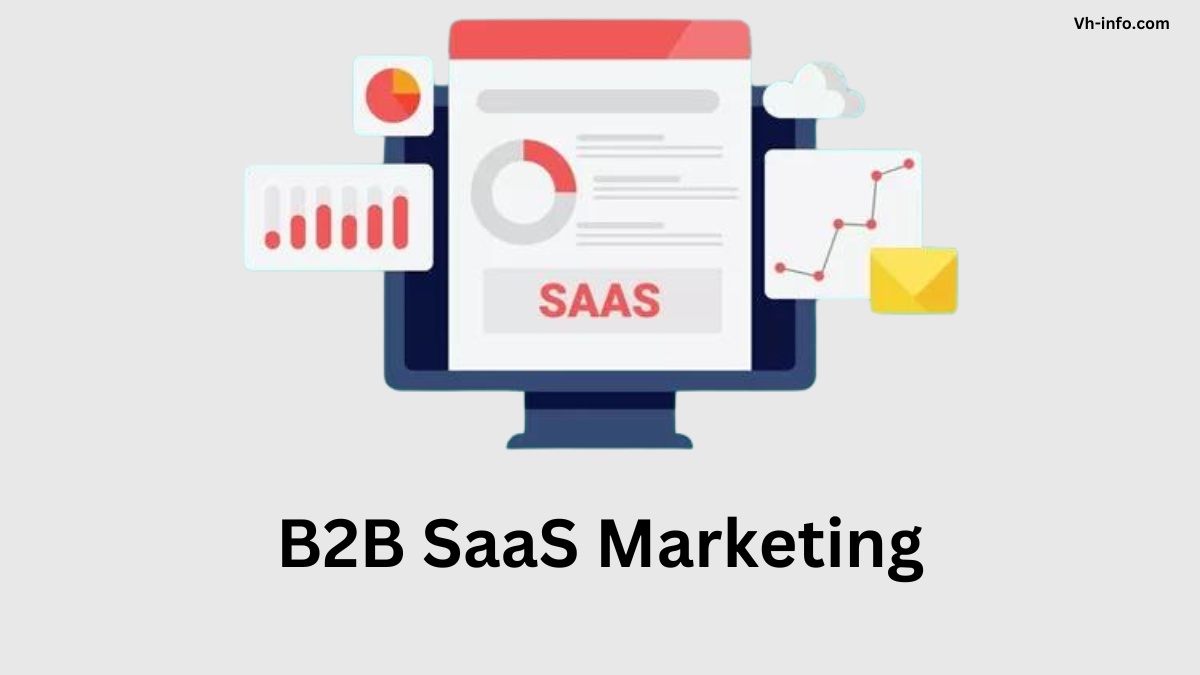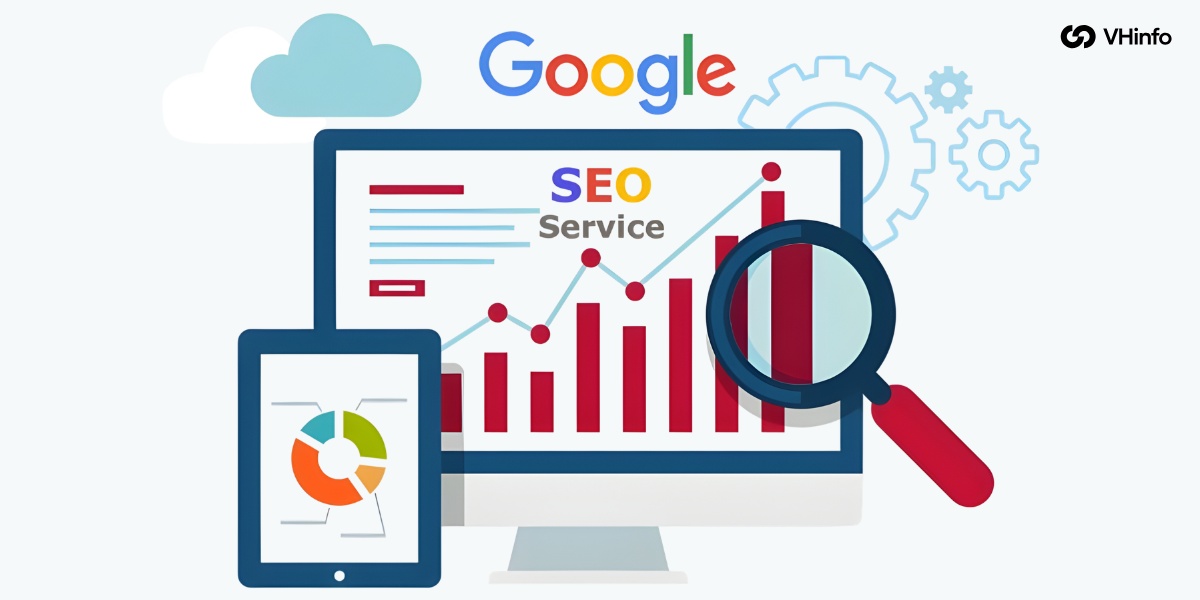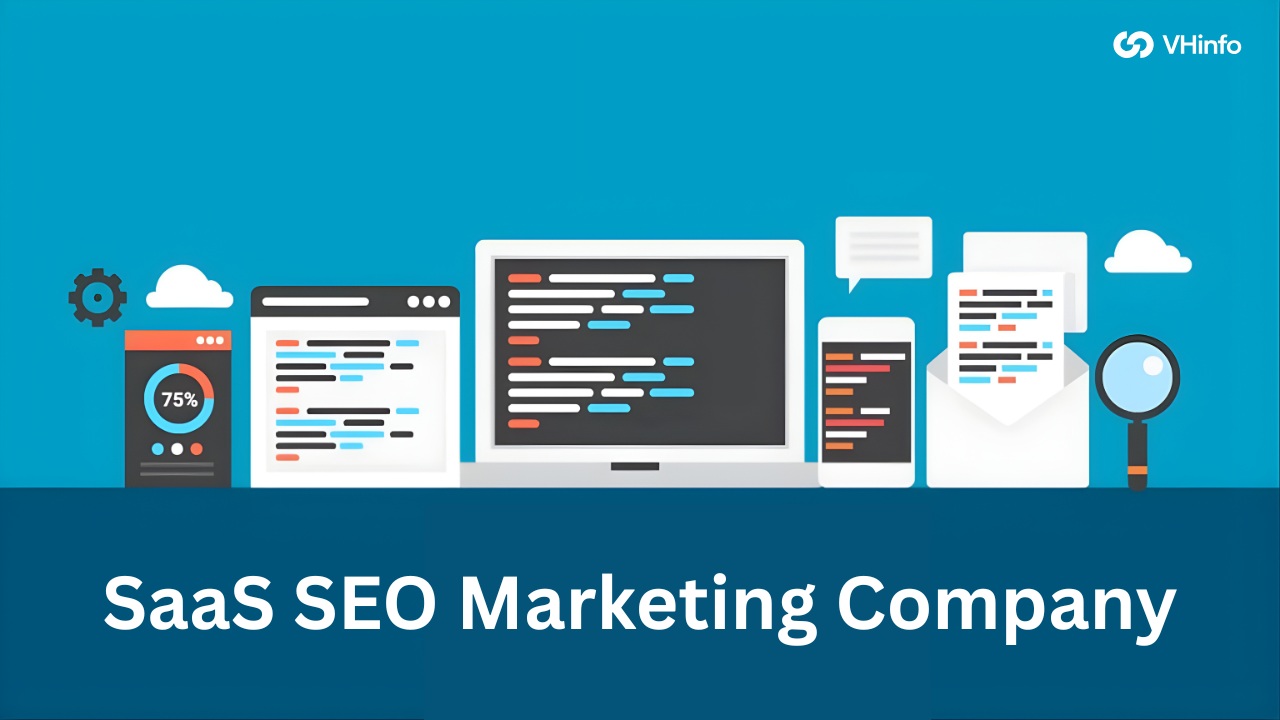In the dynamic world of software as a service (SaaS), effective marketing is important for standing out in a crowded market and driving sustainable growth.
B2B SaaS companies face unique challenges, such as selling intangible products, navigating long sales cycles, and combating high customer churn rates.
To overcome these hurdles and achieve success, SaaS businesses must implement targeted, data-driven marketing strategies that resonate with their ideal customers in their customer journey.
What is B2B SaaS Marketing?
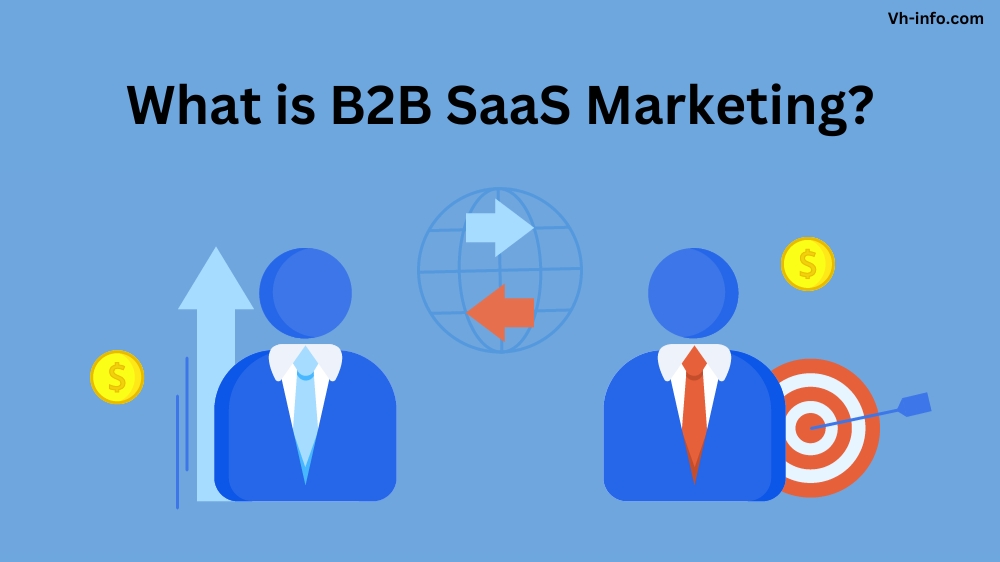
B2B SaaS marketing refers to the strategies and tactics used by SaaS companies to promote their products or services to other businesses. The goal is to attract, engage, and convert potential customers into loyal subscribers by demonstrating the value and benefits of the software solution.
How Does B2B SaaS Marketing Differs From Other Types of Marketing?
Unlike traditional product marketing, B2B SaaS marketing focuses on selling a subscription-based service rather than a tangible item. This means that marketers must continuously prove the value of their product to retain customers and prevent churn.
Moreover, the B2B purchasing process frequently includes numerous decision-makers and extended sales cycles, necessitating a tailored and individualized marketing strategy.
How is B2B SaaS Marketing Unique?
Several factors contribute to the unique nature of B2B SaaS content marketing strategy:
- Intangible Product: SaaS products are intangible, making it challenging to showcase their value through traditional marketing channels. Marketers must rely on demonstrations, case studies, and testimonials to illustrate the benefits of their software. So, many prefer to work with a B2B web design agency to help them create websites that highlight real results, build trust fast, and actually convert.
- Long Sales Cycle Involving Multiple Team Members: B2B SaaS sales often involve multiple stakeholders and decision-makers, resulting in longer sales cycles. Marketers must create content and campaigns that address the needs and concerns of each marketing team member involved in the buying process.
- Scalability: SaaS products are designed to scale with a business’s growth, which means marketing efforts must focus on attracting customers with long-term potential and demonstrating the software’s ability to accommodate their evolving needs.
- Customer Churn: High customer churn rates are a common challenge in the SaaS industry. Marketers must prioritize customer retention by continuously delivering value, providing excellent customer support, and encouraging product adoption.
- Heavy Competition: The SaaS market is highly competitive, with numerous players offering similar solutions. To stand out, SaaS companies must differentiate themselves through unique value propositions, targeted messaging, and exceptional customer experiences.
- Integration with Existing Technologies: B2B SaaS products often need to integrate with a company’s existing technology stack. Marketers must highlight their product’s compatibility and seamless integration capabilities to address potential concerns and objections. For additional insights on ensuring smooth integration, consider reviewing how various Ipaas vendors approach these challenges.
How Do SaaS Companies Stand Out From the Competition?
To differentiate themselves in a crowded market, SaaS companies can employ several strategies:
- Devise a UI/UX Strategy: Investing in a user-friendly, intuitive interface and seamless user experience can set a SaaS product apart from competitors. By prioritizing UI/UX, companies can improve customer satisfaction, reduce churn, and increase brand loyalty.
- Find What Makes You Unique: SaaS companies must identify and communicate their unique selling proposition (USP). This could be a specific feature, pricing model, or exceptional customer service that distinguishes them from rivals.
- Plan a Long-Term Business Model: Developing a sustainable, long-term business model is important for SaaS success. Companies should focus on strategies that promote customer retention, such as offering annual subscriptions, implementing a customer success program, and continuously innovating their product.
- Focus on Value Instead of Cost in Competition: Instead of engaging in price wars, SaaS companies should emphasize the value their product delivers. By highlighting the ROI, time savings, and efficiency gains customers can achieve, marketers can justify their pricing and avoid commoditization.
Key Strategies For B2B SaaS Marketing
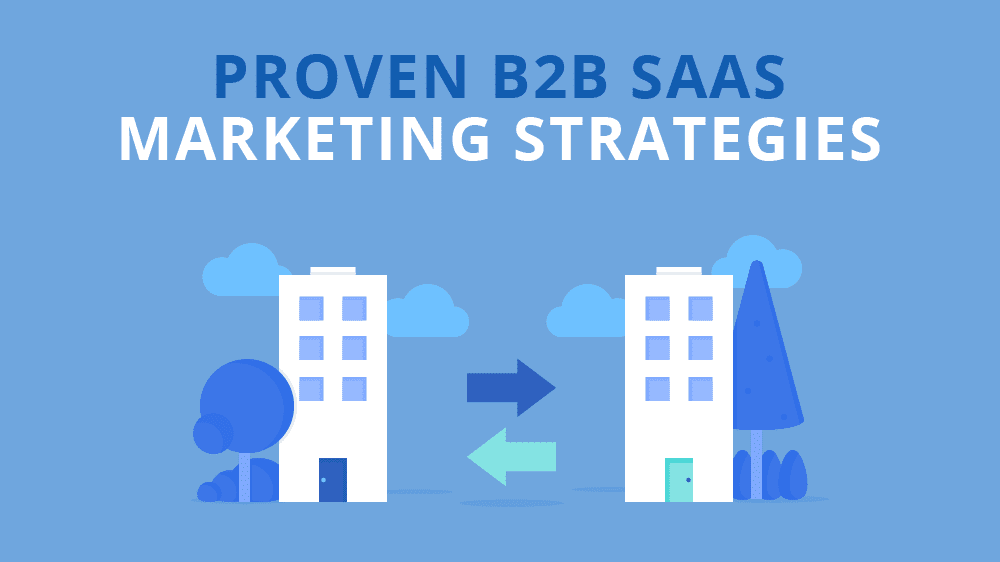
To effectively reach and engage their target audience, B2B SaaS companies can leverage a variety of digital marketing strategies:
Content Marketing and SEO
Creating high-quality, informative content that addresses potential customers’ needs and pain points is essential for attracting organic traffic and establishing thought leadership. SaaS companies can enhance their search engine rankings and attract more qualified leads to their website’s landing page by optimizing content for relevant keywords and creating backlinks.
VH Info, a leading SaaS link-building agency, specializes in helping SaaS companies boost their online visibility and authority through strategic content marketing, keyword research, link building and SEO. Partnering with VH Info enables SaaS companies to gain expert advice and tested strategies to improve their search results and appeal to their website visitors in the best way.
Product Led Growth (PLG)
Product-led growth is a strategy that relies on the product itself as the primary driver of customer acquisition, retention, and expansion. For businesses built around Express dropshipping, this approach means optimizing product listings and user experience to naturally convert visitors into buyers.
By offering a freemium model or a limited-time free trial, SaaS companies can allow potential customers to experience the value of their product firsthand, increasing the likelihood of conversion.
Account-Based Marketing (ABM)
Account-based marketing involves targeting specific high-value accounts with personalized marketing campaigns.
By tailoring content, messaging, and offers to the unique needs of each target account, SaaS companies can improve engagement, shorten sales cycles, and increase conversion rates.
Referral and Affiliate Marketing
Leveraging the power of word-of-mouth marketing can be highly effective for SaaS companies. Businesses can tap into a cost-effective and trusted acquisition channel by implementing a referral program that incentivizes current customers to recommend the product to others, turning them into loyal customers.
Similarly, partnering with affiliates who promote the product to their audience can help expand the reach and drive more sign-ups through review sites and social proof, ultimately leading to a strong brand presence in the market.
Influencer Marketing
Collaborating with industry influencers and thought leaders can help SaaS companies gain credibility, expand their reach, and attract new customers. By partnering with influencers to create sponsored content, host webinars, or participate in events, SaaS brands can tap into new audiences and build trust with potential buyers.
Paid Advertising (PPC, Social Ads, Etc.)
While organic marketing tactics are important for long-term success, paid advertising can provide a quick boost in visibility and lead generation. SaaS companies can leverage pay-per-click (PPC) advertising on search engines, social media platforms, and industry websites to target specific audiences and drive more traffic to their website.
How to Execute An Effective B2B SaaS Marketing Strategy?
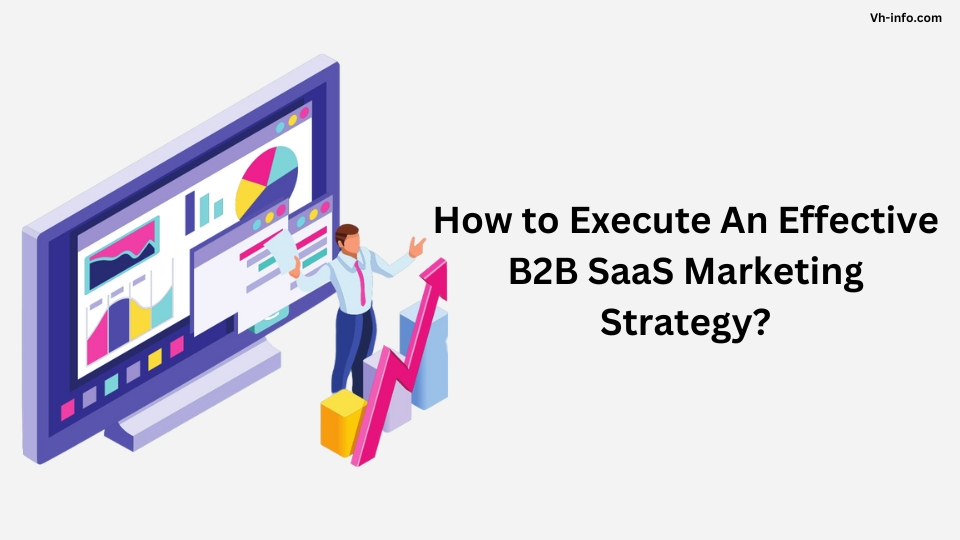
To successfully implement a B2B SaaS marketing strategy, follow these steps:
- Get to Know the Businesses You Want to Target: Conduct thorough market research to identify your ideal customer profile (ICP). Understand their needs, challenges, and buying behaviors to create targeted messaging and campaigns that resonate with them.
- Discover What Features Your Customer Needs: Engage with your target audience through surveys, interviews, and feedback sessions to uncover the features and benefits they value most in a SaaS solution. Use these insights to inform your product development and marketing efforts.
- Formulate an Action Plan: Develop a comprehensive SaaS marketing plan that outlines your goals, target audience, key messaging, tactics, and metrics for success. Ensure that your plan aligns with your overall business objectives and resources.
- Execute and Monitor Your KPIs: Implement your marketing plan and continuously track your key performance indicators (KPIs) to measure the effectiveness of your efforts. Use data-driven insights to optimize your strategies and allocate resources to the most impactful channels and tactics.
Measuring and Optimizing B2B SaaS Marketing Performance
To ensure the success of your B2B SaaS marketing efforts, it’s essential to establish clear metrics and regularly assess your performance.
Key metrics to track include:
- Website traffic and engagement
- Lead generation and conversion rates
- Customer acquisition cost (CAC)
- Customer lifetime value (CLV)
- Churn rate
- Net Promoter Score (NPS)
B2B SaaS Marketing Challenges

Despite the numerous growth opportunities, B2B SaaS marketers face several challenges:
Challenge #1: Oversaturated Markets
With countless SaaS solutions available, standing out in a crowded market can be difficult. To overcome this challenge, companies must focus on differentiating their product, targeting niche audiences, and delivering exceptional customer experiences.
Challenge #2: Complicated Offerings
SaaS products often have complex features and technical aspects that can be challenging to communicate effectively to potential customers. Marketers must simplify their messaging and use clear, concise language to convey the value and benefits of their product.
Challenge #3: Convincing Customers They Need Your Product
Many potential customers may not realize they need a SaaS solution or may be hesitant to change their existing processes. SaaS marketers must educate their target audience on the problems their product solves and the value it delivers to overcome objections and drive adoption.
Challenge #4: Long Sales Cycles
B2B SaaS sales cycles can span several months, requiring marketers to maintain engagement and nurture leads throughout the lengthy buying process. Implementing lead scoring, personalized content, and multi-channel nurturing campaigns can help keep prospects engaged and move them closer to conversion. By incorporating lead routing strategies into the process, marketers can ensure that the right leads are passed on to sales at the optimal time for conversion.
Challenge #5: Complex Decision-Making Process
With multiple stakeholders involved in B2B SaaS purchases, marketers must create content and campaigns that address the needs and concerns of each decision-maker. Developing buyer personas and tailoring messaging to each role can help ensure that marketing efforts resonate with all members of the buying committee.
Examples of B2B SaaS Marketing Strategies

To inspire your own B2B SaaS marketing efforts, let’s explore some successful campaigns from well-known companies:
- Canva: What Will You Design Today?- Canva, a graphic design platform, uses a simple yet powerful tagline to encourage users to explore their creativity. By focusing on the endless possibilities their product offers, Canva appeals to a wide range of customers and inspires them to take action.
- Mailchimp: Turn Clustomers into Customers- Mailchimp, an email marketing platform, cleverly plays on the word “customers” to highlight its product’s ability to convert subscribers into paying customers. This memorable tagline effectively communicates the value Mailchimp delivers to businesses.
- AirTable: This is How- AirTable, a cloud collaboration platform, uses a minimalist tagline to showcase its product’s versatility and adaptability. By implying that AirTable is the solution to various business challenges, the company positions itself as an essential tool for modern teams.
- HubSpot: Grow Better- HubSpot, a leading CRM and marketing automation platform, emphasizes the growth potential their product offers. The “Grow Better” tagline appeals to businesses looking to scale and improve their operations, positioning HubSpot as a valuable partner in their success.
- Salesforce: Ask More of AI- Salesforce, a cloud-based CRM platform, highlights the power of artificial intelligence in their marketing. By encouraging customers to “Ask More of AI,” Salesforce positions itself as a leader in innovative, AI-driven solutions that can revolutionize business processes.
- Shopify: Let’s Make You a Business- Shopify, an e-commerce platform, directly addresses its target audience with a bold, action-oriented tagline. “Let’s Make You a Business” speaks to aspiring entrepreneurs and small business owners, positioning Shopify as the go-to solution for launching and growing an online store.
- Dropbox: For All Things Worth Saving- Dropbox, a cloud storage and file-sharing platform, uses an emotional appeal to connect with users. By emphasizing the importance of saving and preserving valuable content, Dropbox positions itself as a reliable and trustworthy solution for both personal and business use.
- Adobe: Create Forward- Adobe, a creative software suite, uses a simple yet powerful tagline to inspire users to push boundaries and innovate. “Create Forward” speaks to the company’s commitment to empowering creatives and driving progress through cutting-edge tools and technologies.
- Slack: House of Slack- Slack, a team collaboration platform, uses a playful and memorable tagline to showcase its product’s ability to bring teams together. “House of Slack” implies that the platform is a central hub for communication and collaboration, fostering a sense of community and belonging.
- Zoom: Brand Partnerships with Formula 1 and Good American- Zoom, a video conferencing platform, has leveraged strategic brand partnerships to expand its reach and appeal to new audiences. By collaborating with Formula 1 and Good American, Zoom showcases the versatility and reliability of its product in diverse industries and use cases.
B2B SaaS Marketing Best Practices
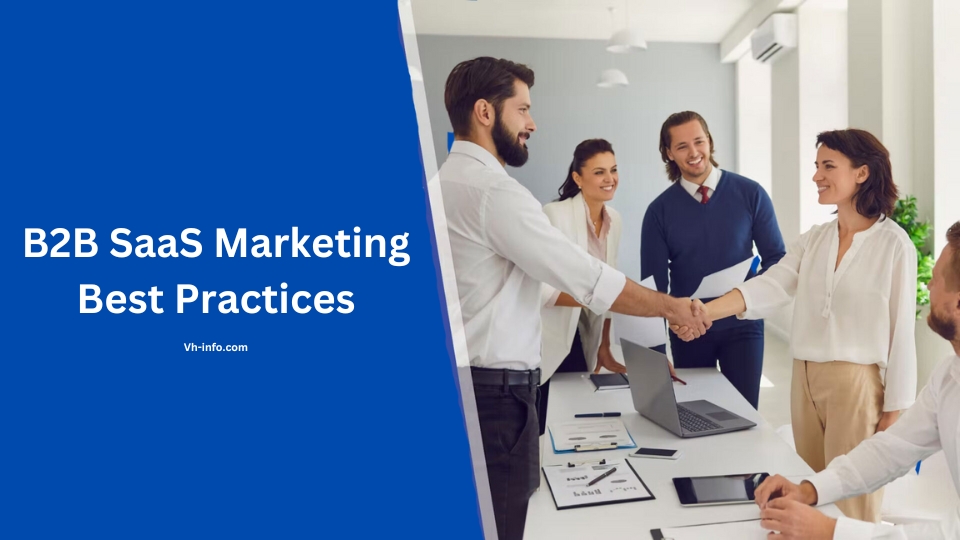
To maximize the impact of your B2B SaaS marketing efforts, follow these best practices:
- Develop a deep understanding of your target audience and their needs
- Create a compelling value proposition that sets you apart from competitors
- Invest in high-quality, informative content that addresses customer pain points
- Optimize your website and content for search engines to improve visibility
- Leverage data and analytics to inform your marketing decisions and measure success
- Continuously test and refine your strategies based on performance metrics
- Foster a customer-centric culture that prioritizes exceptional experiences and supports
FAQ’s:
How Should I Market B2B SaaS Products?
To effectively market B2B SaaS products, focus on strategies that educate potential customers, demonstrate the value of your product, and build trust. This can include content marketing, product demos, case studies, and targeted advertising campaigns.
Can Content Marketing Drive Sales in B2B SaaS?
Yes, content marketing can be a powerful driver of sales in B2B SaaS.
Generating valuable and informative content that speaks to the needs and challenges of your target audience can help you draw in potential customers, foster trust, and position your brand as an industry authority.
When combined with strategic calls-to-action and lead nurturing campaigns, content marketing can effectively guide prospects through the sales funnel and ultimately drive conversions.
Additionally, utilizing social media marketing can enhance the impact of your content and reach a wider audience, further driving sales for your B2B SaaS company.
Conclusion
In the competitive world of B2B SaaS, effective marketing is essential for driving growth, building brand awareness, and fostering long-term customer relationships.
Companies can create specific strategies that appeal to their target customers and distinguish themselves from competitors by grasping the distinct challenges and possibilities of the SaaS sector.
From content marketing and SaaS SEO to product-led growth and account-based marketing, there are numerous tactics B2B SaaS companies can employ to attract, engage, and convert their target audience.
As the B2B SaaS landscape continues to evolve, companies that adapt their marketing strategies to meet the changing needs and preferences of their customers will be well-positioned to thrive.
